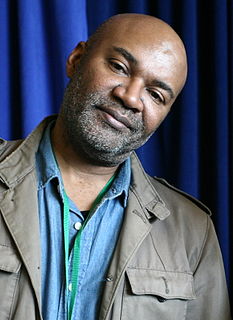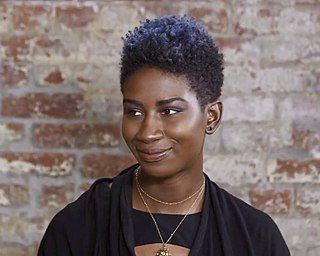Related Research Articles

Julie Ethel Dash is an American film director, writer and producer. Dash received her MFA in 1985 at the UCLA Film School and is one of the graduates and filmmakers known as the L.A. Rebellion. After she had written and directed several shorts, her 1991 feature Daughters of the Dust became the first full-length film directed by an African-American woman to obtain general theatrical release in the United States.

Shirley Anita Chisholm was an American politician, educator, and author. In 1968, she became the first black woman elected to the United States Congress, representing New York's 12th congressional district, a district centered on Bedford-Stuyvesant, for seven terms from 1969 to 1983. In the 1972 United States presidential election, she became the first black candidate to run for a major party's nomination for President of the United States, and the first woman to run for the Democratic Party's presidential nomination.

Euzhan Palcy is a film director, writer and producer from Martinique, French West Indies. When she directed a A Dry White Season in 1989, she was the first black woman director of a film produced by a major Hollywood studio (MGM). She is also the only woman filmmaker to have directed Marlon Brando, whom she brought back to the screen after a gap of nine years. Palcy is the first black director to direct an actor to an Oscar nomination and the first black director to win a César Award, the highest French film award. She is also the first black director to win a Venice Film Festival Award.
Women's cinema is a variety of topics bundled together to create the work of women in film. This can include women filling behind the scene roles such as director, cinematographer, writer, and producer while also addressing the stories of women and character development through screenplays.
The American Black Film Festival is an independent film festival that focuses primarily on black film -- works by Black members of the film industry. It is held to recognize achievements of film actors of African descent and to honor films that stand out in their portrayal of Black experience.

Nelson George is an American author, columnist, music and culture critic, journalist, and filmmaker. He has been nominated twice for the National Book Critics Circle Award.

Cheryl Dunye is a Liberian-American film director, producer, screenwriter, editor and actress. Dunye's work often concerns themes of race, sexuality, and gender, particularly issues relating to black lesbians.

Stanley Earl Nelson Jr. is an American documentary filmmaker and a MacArthur Fellow known as a director, writer and producer of documentaries examining African-American history and experiences. He is a recipient of the 2013 National Humanities Medal from President Obama. He has won three Primetime Emmy Awards.

Kimberlé Williams Crenshaw is an American lawyer, civil rights advocate, philosopher, and a leading scholar of critical race theory. She is a full-time professor at the UCLA School of Law and Columbia Law School, where she specializes in race and gender issues. Crenshaw is also the founder of Columbia Law School's Center for Intersectionality and Social Policy Studies (CISPS) and the African American Policy Forum (AAPF), as well as the president of the Berlin-based Center for Intersectional Justice (CIJ).

Ava Marie DuVernay is an African-American filmmaker. She won the directing award in the U.S. dramatic competition at the 2012 Sundance Film Festival for her second feature film Middle of Nowhere, becoming the first black woman to win the award. For her work on Selma (2014), DuVernay became the first black woman to be nominated for a Golden Globe Award for Best Director, and also the first black female director to have her film nominated for the Academy Award for Best Picture. In 2017, she was nominated for the Academy Award for Best Documentary Feature for her film 13th (2016).
Black women filmmakers have faced both race and gender disparity in their field; despite challenges, however, notable contributions have been made throughout the history of film by black women who have broken through the celluloid ceiling to become pioneers in filmmaking.
Ngozi Onwurah is a British-Nigerian film director, producer, model, and lecturer. She is best known as a filmmaker for her autobiographical film The Body Beautiful (1991) and her first feature film, Welcome II the Terrordome (1994). Her work is reflective of the unfiltered experiences of Black Diaspora in which she was raised.

Dark Girls is a 2011 documentary film by Bill Duke and D. Channsin Berry. It documents colorism within the African American community, a subject still considered taboo by many black Americans. The film contains interviews of African American women describing the role colorism has played in their lives, with notable African Americans including Viola Davis also detailing her experience. It also reports on a new version of the 1940s black doll experiment by Kenneth and Mamie Clark, which proved that black children had internalized racism by having children select a white or a black doll based on questions asked. In the updated version, black children favored light-skinned dolls over dark-skinned dolls.

Yaba Badoe is a Ghanaian-British documentary filmmaker, journalist and author.
Barbara McCullough is a director, production manager and visual effects artist whose directorial works are associated with the Los Angeles School of Black independent filmmaking. She is best known for Water Ritual #1: An Urban Rite of Purification (1979), Shopping Bag Spirits and Freeway Fetishes: Reflections on Ritual Space (1980), Fragments (1980), and World Saxophone Quartet (1980).

Sabaah Folayan is an American filmmaker and activist. Her debut documentary feature, Whose Streets?, on the 2014 Ferguson protests, premiered in competition at the 2017 Sundance Film Festival.
Florence Ayisi was born in Kumba in Cameroon in 1962. She is an academic and filmmaker. Her film Sisters in Law won more than 27 awards and was short-listed for an Academy Award nomination in 2006. She won the UK Film Council Breakthrough Brits Award for Film Talent in 2008. Since 2000 she has taught film at the University of South Wales.

The Reel Sisters of the Diaspora Film Festival & Lecture Series is an annual film festival founded by African Voices magazine and Long Island University's Media Arts Department, Brooklyn Campus. Established in 1997, Reel Sisters is dedicated to providing opportunities for women of color filmmakers to advance their careers in the film industry.
Prof. Branwen Kiemute Okpako, is a Nigerian–born Welsh German filmmaker. She is most notable as the director of critically acclaimed films The Education of Auma Obama, Dirt for Dinner and Landing. Apart from direction, she is also a writer, producer, cinematographer, film editor as well as a lecturer.

Samuel D. Pollard is an American film director, editor, producer, and screenwriter. His films have garnered numerous awards such as Peabodys, Emmys, and an Academy Award nomination. In 2020, the International Documentary Association gave him a career achievement award. Spike Lee, whose films Pollard has edited and produced, described him as being "a master filmmaker." Henry Louis Gates Jr. characterizes his work in this way: “When I think about his documentaries, they add up to a corpus — a way of telling African-American history in its various dimensions.”
References
- 1 2 "Daphne Valerius". DaphneValerius.com. Retrieved 25 Feb 2017.
- 1 2 "Producer Daphne Valerius to present documentary, The Souls of Black Girls, Feb. 27". Kingston: University of Rhode Island. 16 Feb 2008. Retrieved 25 Feb 2017.
- 1 2 3 "The Souls of Black Girls". SoulsofBlackGirls.com. Retrieved 25 Feb 2017.
- ↑ Aspire TV. "Daphne Valerius". aspire.tv. Archived from the original on 26 February 2017. Retrieved 25 Feb 2017.
- ↑ O'Neal Parker, Lonnae (2012-02-27). "Black women heavier and happier with their bodies than white women, poll finds". The Washington Post. Retrieved 2017-02-25.
- ↑ Whitlock, Erin (2008). "The Souls of Black Girls". Clutch Magazine.
- ↑ Chase, Nikki. "The Souls of Black Girls: Interview with Daphne Valerius". NewEnglandFilm.com. Retrieved 25 Feb 2017.
- 1 2 Pratt, Tim (30 Nov 2010). "Filmmaker Valerius Goes to the White House". Emerson College. Retrieved 25 Feb 2017.
- ↑ Thompson, Krissah; Williams, Vanessa (2012-01-23). "African American women see their own challenges mirrored in Michelle Obama's". The Washington Post. Retrieved 2017-02-25.
Daphne Valerius calls Obama a “poster woman.” “For a long time all we had was Oprah,” says Valerius, 30, a filmmaker who has made a documentary exploring whether negative media portrayals are harming the self-image of women of color. She met Obama briefly when her film, “Souls of Black Girls,” got her an invitation to a White House screening of the motion picture “For Colored Girls.”
- ↑ Challenges Facing Black Women. C-SPAN. 2008-07-11.
- ↑ Owens, Donna M. (2016-09-14). "Congressional Black Caucus Week Kicks Off". Essence. Retrieved 2017-02-25.